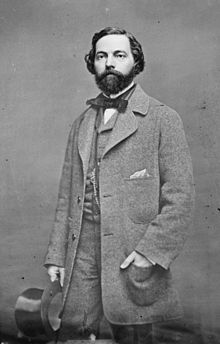William Porcher Miles
|
The Honorable William Porcher Miles |
|
|---|---|
 |
|
| Member of the C.S. House of Representatives from South Carolina's 2nd District | |
|
In office February 18, 1862 – March 18, 1865 |
|
| Preceded by | Office established |
| Succeeded by | Office abolished |
| Member of the Provisional C.S. Congress from South Carolina |
|
|
In office February 4, 1861 – February 18, 1862 |
|
| Preceded by | Position established |
| Succeeded by | Position abolished |
| Member of the U.S. House of Representatives from South Carolina's 2nd district |
|
|
In office March 4, 1857 - December 24, 1860 |
|
| Preceded by | William Aiken |
| Succeeded by | Christopher Bowen (1868) |
| 36th Mayor of Charleston | |
|
In office November 7, 1855 – November 4, 1857 |
|
| Preceded by | Leger Hutchinson |
| Succeeded by | Charles Macbeth |
| Personal details | |
| Born |
July 4, 1822 Walterboro, South Carolina |
| Died | May 11, 1899 (aged 76) Ascension Parish, Louisiana |
| Resting place | Union, West Virginia |
| Nationality | American |
| Political party | Democratic |
| Alma mater | College of Charleston |
| Profession | Farmer, academic, politician |
| Military service | |
| Allegiance | Confederate States of America |
| Service/branch | Provisional Army of the Confederate States |
| Years of service | 1861 |
| Rank |
|
| Battles/wars | American Civil War |
William Porcher Miles (July 4, 1822 – May 11, 1899) was among the ardent States' Rights advocates, supporters of slavery, and Southern secessionists who came to be known as the "Fire-Eaters." He is notable for having designed the most popular variant of the Confederate flag, originally rejected as the national flag in 1861, but adopted as a battle flag by the Army of Northern Virginia under General Robert E. Lee before being reincorporated by William Tappan Thompson into the second design of the national flag in 1862.
Born in South Carolina, he showed little early interest in politics and his early career included the study of law and a tenure as a mathematics professor at the College of Charleston from 1843 to 1855. In the late 1840s as sectional issues roiled South Carolina politics, Miles began to speak up on sectional issues. He opposed both the Wilmot Proviso and the Compromise of 1850. Miles would, from this point on, look at any northern efforts to restrict slavery as justification for secession.
Miles was elected as mayor of Charleston in 1855 and served in the United States House of Representatives from 1857 until South Carolina seceded in December 1860. He was a member of the state secession convention and a representative from South Carolina at the Confederate Convention in Montgomery, Alabama that established the provisional government and constitution for the Confederate States of America. He represented his state in the Confederate House of Representatives during the American Civil War.
Miles was born in Walterboro, South Carolina to James Saunders Miles and Sarah Bond Worley Miles. His ancestors were French Huguenots and his grandfather, Major Felix Warley, fought in the American Revolution. His primary education came at Southworth School and he later attended Willington Academy where John C. Calhoun had matriculated a generation earlier. Miles enrolled at the College of Charleston in 1838 where he met future secession advocates James De Bow and William Henry Trescot. Miles graduated in 1842 and in 1843 he briefly studied law with a local attorney before returning to his alma mater as a mathematics professor.
...
Wikipedia
